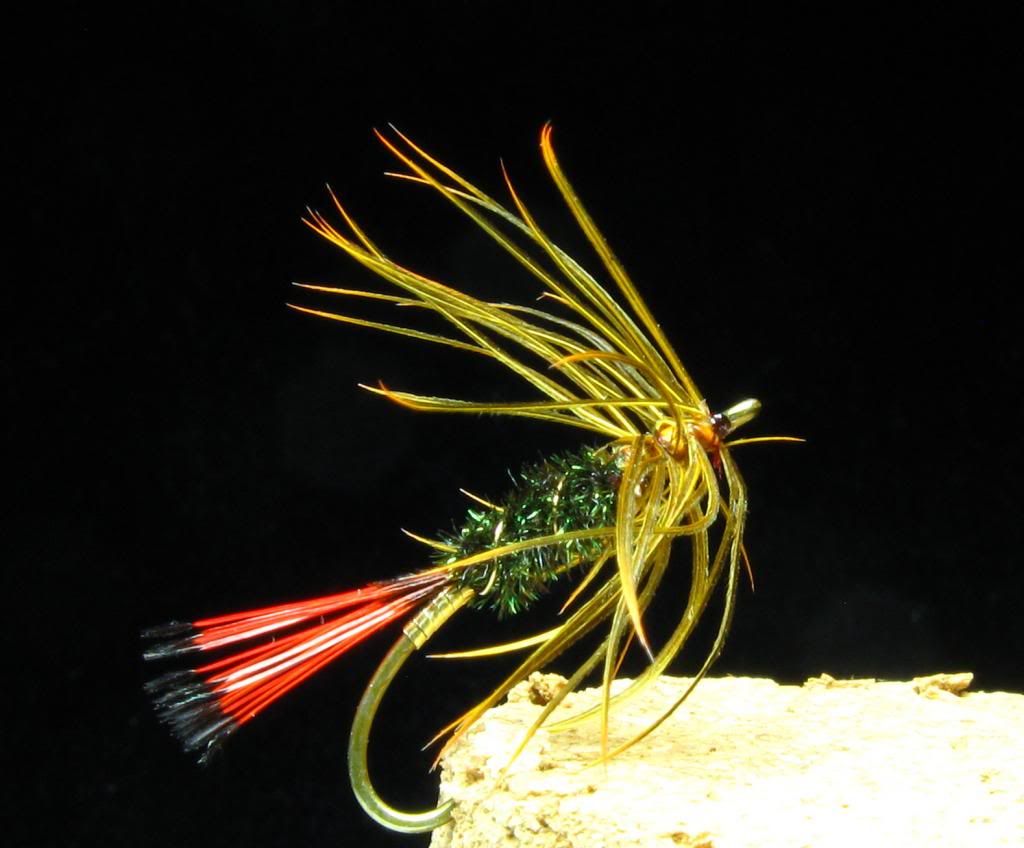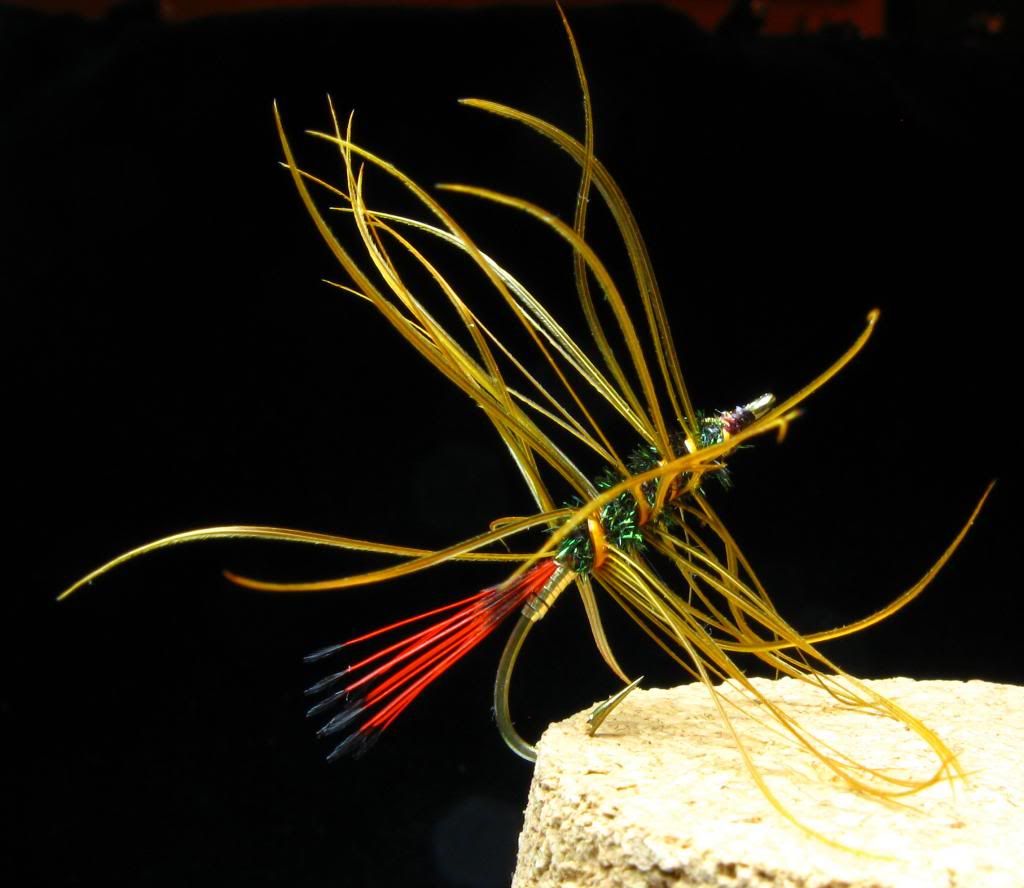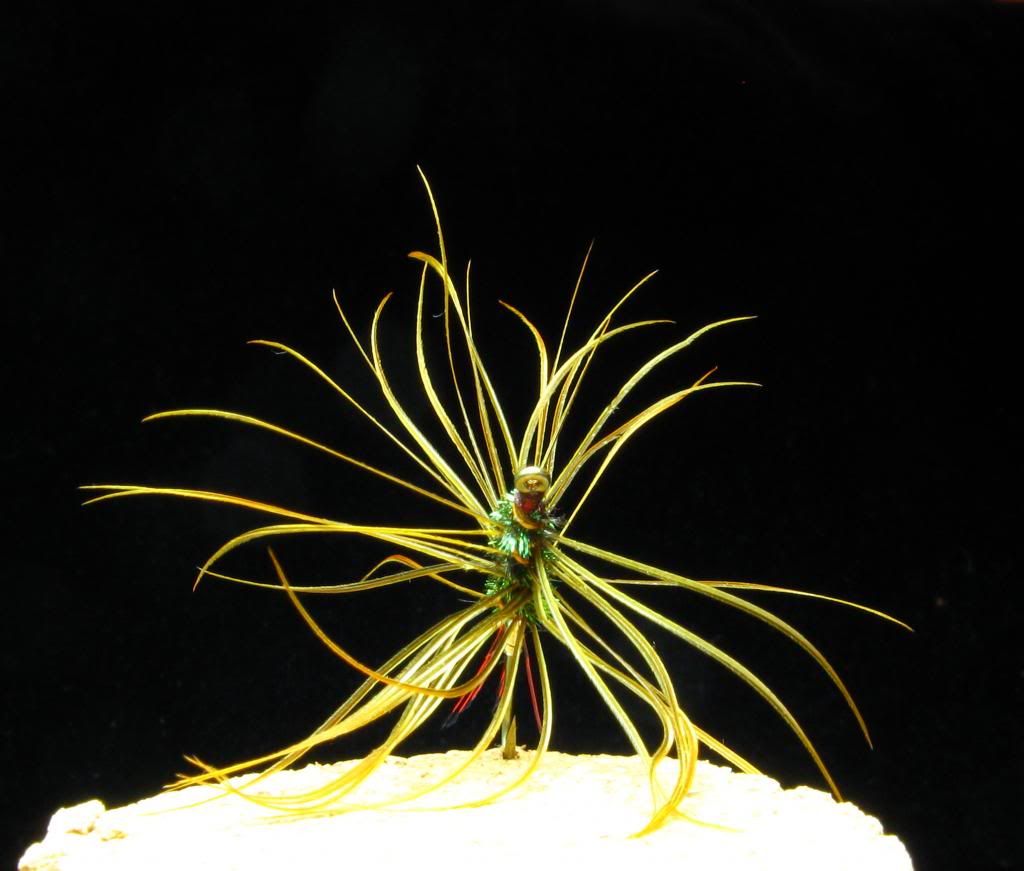Page 1 of 2
13 ways of looking at a blackbird
Posted: Sun Nov 25, 2012 6:42 pm
by CreationBear
A few more from my starling this afternoon:
1.) Standard issue flymph:

2.) This is a variation of a local pattern popularized by Hugh Hartsell--it uses a split primary or tail feather as the hackle (though Hugh uses a body of black rabbit dubbing, I believe.)

3.) And a version of the classic "Yaller Hammer;" as the name implies, it was originally tied with a split primary feather from a northern flicker. Modern (not to mention legal

) subs include dyed mourning dove, starling, and guinea. (You can also trim the hackle as you might a Breadcrust, but I must admit I like 'em wild and wooly.

)


At any rate, one thing these flies taught me is that I need a whole lot more practice splitting feather stems...I'm not sure if it's quite worth the effort to go through the whole soaking/razoring procedure, but it does let me use feathers off of a pelt that would normally go to waste.
Re: 13 ways of looking at a blackbird
Posted: Sun Nov 25, 2012 6:49 pm
by Mataura mayfly
Definitely worth the effort, what a fantastic looking group of flies and superb photographs of them.
Re: 13 ways of looking at a blackbird
Posted: Sun Nov 25, 2012 7:02 pm
by CreationBear
Definitely worth the effort
Thanks, though I will admit I whittled through a few feathers before I got some strips long enough to wrap.

FWIW, there are some folks who maintain that the stiffer feather fibers of the primaries push a bit more water than the truly "soft" soft hackles like the upper coverts and are thus more useful in fast or turbid water. I'm afraid I'm still agnostic about that, but it's as good a theory as any if I manage to catch a fish on these.

Re: 13 ways of looking at a blackbird
Posted: Sun Nov 25, 2012 10:29 pm
by fflutterffly
Beautiful! Looks like the sun is bursting forth.
Re: 13 ways of looking at a blackbird
Posted: Mon Nov 26, 2012 2:23 am
by Donald Nicolson
Somehow I think your 'blackbird' is not the same as the one in the UK.
http://en.wikipedia.org/wiki/Common_Blackbird
Although a very common bird and not at risk, it is a listed songbird, and songbirds are protected in the UK. There are traditional patterns that call for it and dyed starling is the substitute.

Re: 13 ways of looking at a blackbird
Posted: Mon Nov 26, 2012 7:04 am
by CreationBear
It's funny, but there weren't any Starlings in America until 1890, when a group of eccentrics decided it just wouldn't do if the country didn't have ALL of the birds mentioned in William Shakespeare's plays. They released 100 from New York City's Central Park and they've been with us ever since.  At any rate, I see what you mean about the "true" English blackbird...I don't think I noticed one in the wild when I've been in the UK, but the photo's seem to indicate it lacks the iridescent sheen I associate with starlings.
At any rate, I see what you mean about the "true" English blackbird...I don't think I noticed one in the wild when I've been in the UK, but the photo's seem to indicate it lacks the iridescent sheen I associate with starlings.
At any rate, Mr.Hartsell calls that middle fly his "Smoky Mountain Black Bird"--most fish them for a stonefly, I think, but the more I look at it the more it seems like a peeking caddis to me, especially with the dyed orange stem.
Re: 13 ways of looking at a blackbird
Posted: Mon Nov 26, 2012 8:32 am
by tie2fish
Call 'em what you will, folks ... these are gorgeous!
Re: 13 ways of looking at a blackbird
Posted: Mon Nov 26, 2012 10:33 pm
by letumgo
Wow, those are awesome!
Re: 13 ways of looking at a blackbird
Posted: Tue Nov 27, 2012 3:27 am
by Donald Nicolson
Here are Skues comments on the European or common blackbird Turdus merula
**Blackbird. - (Mavis, Black Ousel, or Amsel). - This is a very useful bird. The primaries and secondaries work up very sweetly as wings. The hen is much paler than the cock, and has a faint olive shade over the dull black brown of the body and wings. She is the more useful of the two. The correct pattern of Greenwell’s Glory is winged with hen blackbird, and a great many of the old patterns of Dark Olive used on the Itchen are similarly winged. One of the books gives the tail of the hen for winging a fly. There are a number of soft feathers both on the wings and bodies of both birds, which, though not quoted in the books, may be at times used with advantage for legs of dark flies, or alone as hackles. A fine delicate feather under the wing of the cock, used hackle-wise, makes an excellent wing for a Red Spinner fished upstream, in rough, tumbling water. The quills of the primaries, secondaries, and tail, stripped cleanly off, make excellent dark quill bodies.
Note:- This birds feathers are now unavailable, also using English when British is meant can be very irritating to Northern Irish, Welsh and Scottish fly dressers.
Maybe I'm just a grumpy old bugger. 




Yes I am, the fly looks great by-the-way.
Re: 13 ways of looking at a blackbird
Posted: Tue Nov 27, 2012 3:55 am
by Mataura mayfly
Nice piece of information Donald. I will have to check the status of them here, after all they were introduced here (by British) and not a native.
Tell the truth, every good Scot, Welsh or Northern Irish dweller would rather be known as their own Nationality and not grouped or referred to as English or British!

Bad as thinking we are part of Australia.



 ) subs include dyed mourning dove, starling, and guinea. (You can also trim the hackle as you might a Breadcrust, but I must admit I like 'em wild and wooly.
) subs include dyed mourning dove, starling, and guinea. (You can also trim the hackle as you might a Breadcrust, but I must admit I like 'em wild and wooly.  )
)




